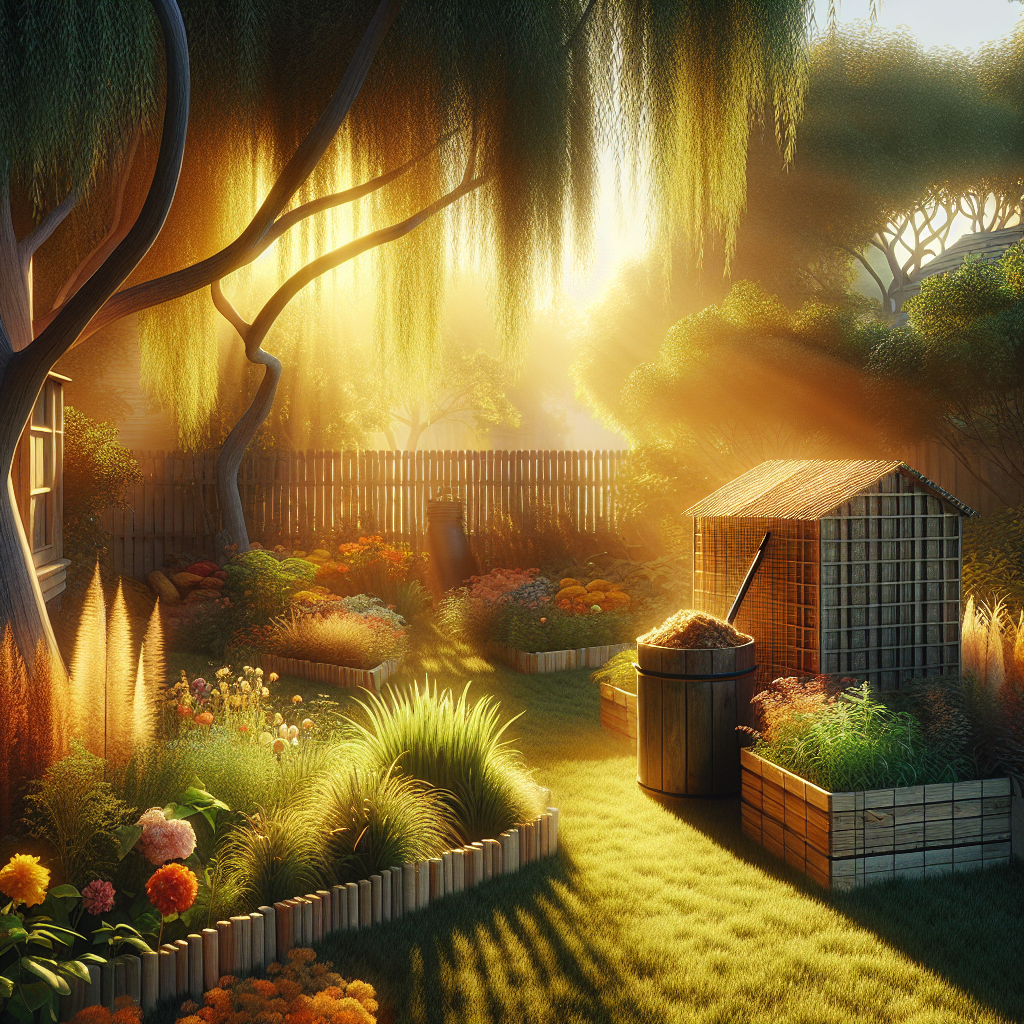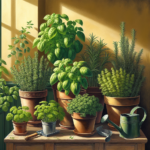Introduction
Welcome to our comprehensive guide on garden fencing options. In this resource, we will explore various fencing materials, styles, and considerations to help you make an informed decision when enhancing the security and aesthetics of your outdoor space.
The Importance of Garden Fencing
Garden fencing serves as more than just a boundary for your property. It adds privacy, defines the space, and enhances the overall appeal of your garden. Additionally, a well-chosen fence can provide protection for your plants and keep unwanted pests at bay.
Factors to Consider
- Material: The choice of material is crucial as it impacts the durability, maintenance requirements, and aesthetic value of the fence.
- Style: From classic wooden fences to modern metal designs, the style of the fence should complement your garden’s overall theme.
- Height: Consider the desired level of privacy and security when determining the height of the fence.
- Cost: Set a realistic budget and explore options that offer the best value for money without compromising on quality.
Our Approach
Throughout this guide, we will delve into the pros and cons of various garden fencing options, offering insights, tips, and recommendations to guide you in selecting the most suitable fencing solution for your needs.
Brief Overview of the Importance of Garden Fencing
Garden fencing plays a pivotal role in enhancing both the aesthetics and security of a property. Let’s delve into why it is a crucial aspect of any outdoor space.
Enhancing Aesthetics
- Defining Boundaries: Fencing helps outline the borders of your garden, creating a distinct and visually appealing separation from the surrounding area.
- Adding Style: The right fencing can complement your garden design, be it a classic white picket fence or a modern sleek metal barrier.
- Creating Privacy: Tall, solid fences provide seclusion, allowing you to enjoy your outdoor sanctuary without intrusion.
Improving Security
- Deterrent to Intruders: A secure fence acts as a physical barrier, dissuading unwanted visitors and safeguarding your property.
- Protecting Children and Pets: Fencing offers a safe enclosure for children and pets to play freely without wandering off.
- Preventing Wildlife Damage: It can also shield your garden from wildlife interference, preserving your plants and landscaping.
Traditional Wooden Fencing
Wooden fences have been a classic choice for garden fencing, offering a timeless appeal and natural beauty to any outdoor space. When considering traditional wooden fencing for your garden, there are several aspects to keep in mind to ensure both aesthetic value and functionality.
Types of Wood
Various types of wood can be used for traditional fencing, each with its own characteristics and benefits:
- Cedar: Known for its durability and resistance to rot.
- Pine: A cost-effective option that can be easily stained or painted.
- Spruce: Offers a smooth surface for a polished look.
Maintenance
Proper maintenance is crucial to prolonging the lifespan of your wooden fence:
- Sealing: Regularly seal the wood to protect it from moisture and UV damage.
- Repairs: Promptly fix any damaged or rotted sections to prevent further issues.
- Cleaning: Periodically clean the fence to prevent mold and mildew buildup.
Design and Style
Traditional wooden fencing can be customized to match your garden’s style:
- Picket Fences: Provide a charming and classic look to your garden.
- Lattice Fencing: Adds a touch of elegance and allows climbing plants to thrive.
- Post and Rail: Offers a rustic and open feel to larger garden areas.
Environmental Impact
Wood is a renewable resource, making it an environmentally friendly choice for fencing. Opting for sustainably sourced wood ensures minimal impact on the environment.
When selecting traditional wooden fencing for your garden, consider both the aesthetic appeal and practical aspects to create a beautiful and functional outdoor space.
Benefits of Wooden Fences
Classic Appeal
Wooden fences exude a timeless and elegant charm that can enhance the aesthetic of any garden or outdoor space. The natural look of wood blends seamlessly with various architectural styles, creating a cozy and inviting atmosphere.
Versatility
Wood offers a versatile fencing option that can be customized to suit different design preferences and functional needs. Whether you prefer a rustic split rail fence or a sophisticated picket fence, wood can be crafted to match your vision.
Customization Options
One of the standout advantages of wooden fences is the ability to customize them according to your specific requirements. From choosing the type of wood and stain color to selecting the height and design details, wooden fences allow for personalized creations tailored to your taste.
Different types of wood used for fencing and their durability in varying weather conditions
1. Cedar
Cedar is a popular choice for fencing due to its natural beauty and durability. It is naturally resistant to rot, decay, and insects, making it suitable for various weather conditions. However, cedar fencing may require staining or sealing to maintain its appearance over time.
2. Redwood
Redwood is another attractive option known for its rich color and natural resistance to decay and insects. It can withstand different weather conditions, especially if it is properly maintained through staining or sealing. Redwood fencing is a premium choice that offers both beauty and durability.
3. Pressure-Treated Pine
Pressure-treated pine is a cost-effective wood option for fencing. The treatment process involves applying chemicals to the wood to enhance its durability and resistance to rot and insects. While pressure-treated pine can withstand moisture and varying weather conditions, it may require regular maintenance to prevent warping or cracking.
4. Cypress
Cypress is a durable wood commonly used in fencing due to its natural rot resistance. It is suitable for humid climates and can withstand moisture well. Cypress fencing may develop a silvery-gray patina over time if left unfinished, adding to its rustic charm.
5. Douglas Fir
Douglas fir is a strong and versatile wood choice for fencing. While not as naturally resistant to decay as cedar or redwood, Douglas fir can still withstand various weather conditions with proper maintenance. It is a more budget-friendly option that offers a balance between durability and cost.
Metal Fencing Solutions
Metal fencing is a versatile and durable option for your garden. With various styles and designs available, it can enhance the security and aesthetics of your outdoor space. Let’s explore some metal fencing solutions that might be perfect for your needs:
1. Iron Fences
Iron fences are known for their classic and elegant appearance. They provide a timeless charm to any garden while offering a high level of security. Considered a top choice for both residential and commercial properties, iron fences can be customized to suit different architectural styles.
2. Aluminum Fences
Aluminum fences are lightweight yet sturdy, making them a practical option for various landscapes. They require minimal maintenance and are available in a wide range of colors and finishes. Aluminum fences are also environmentally friendly as they can be recycled.
3. Steel Fences
Steel fences are incredibly strong and resilient, making them ideal for high-security applications. They are suitable for areas that require maximum protection while offering a sleek and modern look. Steel fences can withstand harsh weather conditions, making them a long-lasting investment.
4. Wrought Iron Gates
Wrought iron gates add an air of sophistication to any garden entrance. These custom-made gates are not only aesthetically pleasing but also provide excellent security. Wrought iron gates can be intricately designed to reflect your personal style and enhance the overall appeal of your property.
5. Chain Link Fences
Chain link fences are a cost-effective and practical solution for both residential and commercial properties. While they are not as decorative as other metal fencing options, chain link fences are durable and low-maintenance. They are ideal for marking boundaries and securing pets or children within the garden.
When choosing a metal fencing solution for your garden, consider factors such as durability, maintenance requirements, security needs, and aesthetic preferences. Each type of metal fencing offers unique benefits, so select the one that best suits your specific requirements.
Advantages of Metal Fences
Metal fences offer a range of benefits that make them a popular choice for both residential and commercial properties. Let’s explore the advantages of metal fences, including durability, low maintenance, and added security features.
Durability
- Longevity: Metal fences, such as steel or aluminum, are highly durable and can withstand harsh weather conditions, ensuring they last for many years.
- Resilience: They are resistant to rot, decay, and pests, making them a reliable option for long-term fencing needs.
Low Maintenance
Metal fences are known for their low maintenance requirements, providing convenience and cost-effectiveness over time. Some key points include:
- Minimal upkeep: Unlike wood fences that may require regular painting or staining, metal fences typically only need occasional cleaning to maintain their appearance.
- Corrosion resistance: Many metal options are designed to resist rust and corrosion, reducing the need for frequent repairs or replacements.
Added Security Features
Security is a top priority for many property owners, and metal fences offer enhanced security features that can provide peace of mind. Here are some ways metal fences boost security:
- Height and Strength: Metal fences can be designed to be tall and sturdy, serving as an effective deterrent to intruders.
- Customization: Various security enhancements, such as spiked or pointed tops, can be added to metal fences for increased security measures.
- Visibility: Unlike solid barriers, metal fences offer visibility while still providing a barrier, allowing for better surveillance of the property.
Explore popular metal fencing materials like wrought iron, aluminum, and steel
Wrought Iron Fencing
Wrought iron fences are revered for their timeless elegance and durability. They offer a classic look that can add a touch of sophistication to any garden or property.
Key points about wrought iron fencing:
- Strength: Wrought iron is renowned for its strength and sturdiness, providing excellent security.
- Design: Intricate designs and decorative elements can be incorporated into wrought iron fences, enhancing their visual appeal.
- Maintenance: Regular maintenance such as painting and rust-proofing is essential to prolong the lifespan of wrought iron fences.
Aluminum Fencing
Aluminum fences are a popular choice due to their versatility and low-maintenance nature. They offer a balance of aesthetics and functionality.
Key points about aluminum fencing:
- Lightweight: Aluminum is lightweight yet durable, making it easy to install and resistant to rust.
- Versatility: Aluminum fences come in a variety of styles and colors, allowing for customization to suit different design preferences.
- Longevity: Aluminum fences are known for their long lifespan and resistance to weather elements.
Steel Fencing
Steel fences are valued for their strength and security features. They are a reliable choice for both residential and commercial properties.
Key points about steel fencing:
- Durability: Steel is a robust material, offering high levels of security and protection.
- Security: Steel fences provide formidable security, making them ideal for properties where safety is a top priority.
- Customization: Steel fences can be customized in terms of height, design, and color to meet specific needs and preferences.
Vinyl Fences for Low Maintenance
The Appeal of Vinyl Fences
Vinyl fences have gained popularity for their low maintenance qualities, making them a practical choice for homeowners looking to enhance their outdoor space without the hassle of constant upkeep.
Benefits of Choosing Vinyl
- Durability: Vinyl fences are known for their resilience to harsh weather conditions, making them a long-lasting fencing option.
- Easy to Clean: Unlike wood fences that may require staining or painting, vinyl fences can be cleaned with just soap and water, saving you time and effort.
- Varied Styles: From traditional picket fences to modern privacy designs, vinyl offers a range of styles to suit different aesthetic preferences.
Cost-Effectiveness in the Long Run
While the initial cost of installing a vinyl fence may be higher than some other materials, the long-term savings are significant. With minimal maintenance required over the years, vinyl proves to be a cost-effective choice.
Quotes to Consider
“Vinyl fences provide a balance of functionality and aesthetics that homeowners appreciate, adding value to their properties while requiring little maintenance.”
Benefits of Vinyl Fencing
Resistance to Rot
Vinyl fencing offers exceptional resistance to rot, making it a durable choice for outdoor applications. Unlike wood, vinyl does not absorb moisture, preventing decay and ensuring longevity.
Resistance to Fading
One of the key advantages of vinyl fencing is its resistance to fading in the face of sunlight exposure. The color integrity of vinyl remains intact over time, requiring minimal maintenance to retain its aesthetic appeal.
Resistance to Pests
Vinyl fencing serves as a barrier against pests such as termites and other wood-boring insects that can compromise the structural integrity of traditional wood fences. This protection ensures that your fence remains secure and intact for years to come.
Design Options Available with Vinyl Fences and Their Suitability for Different Landscape Styles
When it comes to enhancing your outdoor space with a vinyl fence, there are various design options to consider. Each style can complement different landscape aesthetics, adding both functionality and charm to your garden. Let’s explore the design choices available and how they can harmonize with various landscape styles:
1. Classic Picket Fences
Perfect for: Traditional and cottage-style gardens
Classic picket fences exude a timeless appeal, ideal for creating a charming and inviting look in your garden. Their versatility makes them suitable for various landscape styles, especially traditional and cottage-inspired settings.
2. Privacy Fences
Suited for: Modern and minimalist landscapes
Privacy fences offer seclusion and a contemporary touch to your outdoor space. These sleek designs are perfect for modern landscapes, providing a clean and sophisticated look while enhancing privacy and security.
3. Lattice Top Fences
Best for: Romantic and whimsical gardens
Lattice top fences add a touch of elegance and charm to your garden. Their intricate design complements romantic and whimsical landscape styles, creating a delicate yet functional boundary that enhances the overall aesthetic appeal.
4. Ranch Rail Fences
Ideal for: Rustic and country-inspired landscapes
Ranch rail fences bring a rustic and countryside feel to your outdoor space. These sturdy and open-style fences are perfect for complementing natural landscapes, such as rural or country-inspired gardens, adding a touch of authenticity and simplicity.
5. Contemporary Styles
For: Urban and modern landscapes
Contemporary vinyl fence designs offer a sleek and stylish option for urban and modern garden settings. With clean lines and a modern aesthetic, these fences provide a polished look that complements urban environments and contemporary landscaping styles.
Natural and Eco-Friendly Fencing
The Beauty of Natural Fencing
Natural fencing options offer a harmonious blend with your garden landscape, creating a sustainable and visually appealing enclosure.
Benefits of Eco-Friendly Fencing
- Environmentally Conscious: Eco-friendly fences promote ecological balance and reduce the carbon footprint of your property.
- Safe for Wildlife: These fences provide a safe habitat for various wildlife species, supporting biodiversity.
- Low Maintenance: Many natural and eco-friendly materials require minimal maintenance, saving you time and effort.
Popular Natural Materials
- Bamboo: Known for its durability and rapid regrowth, bamboo is a popular choice for eco-conscious homeowners.
- Willow: With a rustic charm, willow fences add a natural aesthetic to your garden while providing privacy.
- Hedgerows: Living fences created from shrubs and bushes not only offer privacy but also encourage biodiversity.
Factors to Consider
When choosing natural fencing, consider factors such as weather resistance, local regulations, and the aesthetic appeal that complements your garden.
Quotes on Nature’s Beauty
“In every walk with nature, one receives far more than he seeks.” – John Muir
Overview of Eco-Conscious Fencing Options
When it comes to fencing options that not only define your garden space but also contribute positively to the environment, eco-conscious choices like bamboo, willow, and recycled materials stand out as sustainable alternatives. Let’s delve into the details of these environmentally friendly fencing options:
Bamboo Fencing
- Natural Aesthetic: Bamboo fences offer a natural and tropical look to your garden, blending seamlessly with greenery.
- Sustainability: Bamboo is a rapidly renewable resource, making it an eco-friendly choice for fencing material.
- Durability: Despite its lightweight appearance, bamboo is surprisingly strong and durable, ensuring longevity.
Willow Fencing
- Rustic Charm: Willow fences exude a rustic and traditional appeal, perfect for quaint garden settings.
- Flexibility: Willow branches can be woven together to create various designs and heights, providing flexibility in customization.
- Biodegradable: Being a natural material, willow fences are biodegradable, minimizing environmental impact.
Recycled Materials Fencing
- Sustainability: Fences made from recycled materials such as plastic or wood scraps help reduce waste and promote sustainability.
- Customizability: Recycled materials can be molded and shaped into different fence styles, offering a wide range of design options.
- Cost-Effective: Opting for recycled fencing materials can be a budget-friendly choice while supporting eco-conscious practices.
Choosing eco-conscious fencing options not only enhances the aesthetics of your garden but also aligns with sustainable living practices, making a positive impact on the environment.
Environmental Benefits of Choosing Sustainable Fencing Materials for Your Garden
The Importance of Sustainability
Sustainable fencing materials play a crucial role in protecting the environment and promoting ecological balance within your garden.
Advantages of Sustainable Fencing Materials
- Reduced Environmental Impact: Opting for sustainable materials helps in conserving natural resources and reducing carbon footprint.
- Biodiversity Preservation: By using eco-friendly materials, you contribute to preserving wildlife habitats and promoting biodiversity.
- Long-Term Durability: Sustainable fencing materials are often more durable and require less maintenance, leading to decreased resource consumption over time.
Materials to Consider
1. Bamboo: A rapidly renewable resource that is strong, durable, and aesthetically pleasing.
2. Recycled Plastic: Environmentally friendly alternative to traditional materials, offering durability and easy maintenance.
3. Cedar Wood: Naturally resistant to decay and insects, making it a sustainable choice for long-lasting fencing.
Quotes
“Choosing sustainable fencing materials is not just a trend; it is a responsibility towards our planet’s future.” – Environmental Expert
Modern Composite Fencing
When it comes to selecting the best garden fencing options, modern composite fencing stands out as a popular and practical choice. Combining durability with a sleek appearance, composite fencing offers a low-maintenance solution for enhancing your outdoor space.
The Advantages of Modern Composite Fencing
- Durability: Composite materials are designed to withstand various weather conditions, ensuring longevity.
- Low Maintenance: Requires minimal upkeep compared to traditional wood fencing, saving time and effort.
- Aesthetic Appeal: Available in a range of styles and colors, composite fencing can complement any garden design.
- Environmentally Friendly: Made from recycled materials, composite fencing is an eco-conscious choice.
Installation and Cost Considerations
While the initial cost of modern composite fencing may be higher than some alternatives, its long-term benefits often outweigh the investment. Additionally, the ease of installation can help reduce overall expenses.

When selecting fencing for your garden, weighing the upfront cost against the long-term advantages is crucial. Modern composite fencing offers a balance of style, durability, and ease of maintenance that make it a favored choice for homeowners looking to enhance their outdoor living spaces.
Introduction to Composite Fencing Materials Combining Wood Fibers and Recycled Plastic
Composite fencing offers a sustainable and durable alternative to traditional wood or vinyl fencing options. By blending wood fibers and recycled plastic, these materials provide a unique combination of strength, longevity, and eco-friendliness.
Benefits of Composite Fencing:
- Durability: Composite materials are resistant to rot, decay, and insect damage, ensuring a long lifespan for your fence.
- Sustainability: By utilizing recycled plastic and wood fibers, composite fencing helps reduce environmental impact and promote a greener future.
- Low Maintenance: Unlike traditional wood fences, composite options require minimal upkeep and are easy to clean with just soap and water.
- Customization: Composite fencing comes in a variety of colors and styles, allowing you to personalize your outdoor space.
Features of Composite Fencing:
- Strength: Combining wood and plastic creates a sturdy material that can withstand harsh weather conditions and everyday wear and tear.
- Weather Resistance: Composite fences are designed to resist fading, warping, and cracking, making them ideal for outdoor use.
- Safety: The smooth surface of composite fencing reduces the risk of splinters, making it a safe option for families with children and pets.
Installation and Cost Considerations:
While composite fencing may have a higher upfront cost than traditional materials, its longevity and low maintenance requirements can result in cost savings over time. Installation methods may vary, so it’s essential to consult with professionals to ensure a proper and secure fence.
Advantages of Composite Fences in Terms of Durability, Longevity, and Eco-Friendliness
Durability
Composite fences exhibit remarkable durability due to their unique blend of materials, typically a combination of wood fibers and plastic. This results in a product that is resistant to rotting, warping, and splintering, unlike traditional wood fences. The durable nature of composites ensures they can withstand various weather conditions without deteriorating.
Longevity
One of the key benefits of composite fences is their longevity. These fences are designed to last significantly longer than traditional wood fences, with minimal maintenance required to keep them in top condition. The sturdy composition of composites contributes to their extended lifespan, making them a wise investment for the long term.
Eco-Friendliness
Composite fences offer eco-friendly advantages compared to conventional wood fences. By utilizing recycled materials in their production, composite fences help reduce the demand for new timber resources and minimize waste. Additionally, their longevity and durability translate to a lower environmental impact over time, as they require less frequent replacement and maintenance than traditional options.
Decorative Options for Aesthetics
Enhancing the aesthetics of your garden through decorative fencing options can elevate the overall ambiance and visual appeal of your outdoor space. Here, we delve into various choices that not only offer aesthetic value but also functionality.
1. Ornamental Iron Fencing
**Ornamental iron fencing** provides a timeless and elegant look to your garden. Its intricate designs and sturdy structure add a touch of sophistication while ensuring durability.
2. Wooden Fencing with Lattice
**Wooden fencing with lattice** combines the warmth of wood with the decorative charm of lattice patterns, creating a cozy and inviting atmosphere. This option allows for both privacy and style.
3. Decorative Vinyl Fencing
**Decorative vinyl fencing** offers a low-maintenance solution with various decorative styles to choose from. It provides a clean and modern aesthetic while standing strong against environmental elements.
4. Stone or Brick Fencing
**Stone or brick fencing** exudes a rustic and natural appeal, blending seamlessly with garden landscapes. The solid construction not only enhances privacy but also adds a classical touch to the surroundings.
5. Bamboo Fencing
**Bamboo fencing** lends a tropical and eco-friendly vibe to your garden. Its sustainable nature, coupled with distinct visual appeal, makes it a popular choice for those seeking a unique decorative option.
6. Decorative Wire Fencing
**Decorative wire fencing** offers a modern and minimalist aesthetic. With various designs and colors available, it can be customized to complement different garden styles while providing a functional barrier.
Ornamental Fencing Designs to Add Beauty and Style to Your Garden While Maintaining Functionality
Introduction
When it comes to enhancing the aesthetic appeal of your garden while ensuring its functionality, ornamental fencing designs play a crucial role. These designs not only add beauty and style to your outdoor space but also serve practical purposes such as defining boundaries, enhancing security, and providing support for climbing plants. Let’s explore some captivating ornamental fencing options that can transform your garden into a picturesque paradise.
Wrought Iron Fencing
Wrought iron fencing is renowned for its timeless elegance and durability. Its intricate designs, featuring scrollwork and floral motifs, can add a touch of sophistication to any garden. Additionally, the sturdy nature of wrought iron provides robust security without compromising on visual appeal.
Wood and Metal Combination Fences
Combining wood and metal in fencing design offers a harmonious blend of natural beauty and contemporary flair. The warmth of wood softens the industrial look of metal, creating a striking visual contrast that complements various garden styles, from rustic to modern.
Aluminum Fencing
Aluminum fencing is a lightweight yet durable option that comes in a variety of styles, including ornamental designs with decorative pickets and finials. Resistant to rust and corrosion, aluminum fencing is low-maintenance and ideal for enhancing both the charm and security of your garden.
Decorative PVC Fencing
For a practical and stylish fencing solution, decorative PVC fencing offers versatility and longevity. Available in an array of colors and designs, PVC fencing is resistant to weathering, making it a cost-effective choice for adding a pop of color and personality to your garden.
Quotes to Inspire
“A garden without ornamental fencing is like a canvas without a frame – incomplete and lacking in character.” – Garden Design Enthusiast
Key Considerations
- Style Harmony: Choose a fencing design that complements the overall style and theme of your garden.
- Maintenance: Consider the upkeep required for different materials to ensure long-lasting beauty.
- Functionality: Balance aesthetics with practicality by selecting a fence that meets your security and privacy needs.
Considerations for Integrating Decorative Elements into Your Fencing for a Personalized Touch
Choosing the Right Decorative Elements
When looking to integrate decorative elements into your fencing, consider elements that complement the overall aesthetic of your garden or outdoor space. Whether it’s ornate ironwork, charming lattice designs, or natural elements such as vines and flowers, select pieces that reflect your personal style.
Harmonizing with Existing Features
For a cohesive look, ensure that the decorative elements harmonize with the existing features in your garden. Blend these elements seamlessly to create a unified and elegant design.
Practicality and Durability
While aesthetics are important, remember to prioritize practicality and durability when selecting decorative elements for your fencing. Choose materials that can withstanding the elements and require minimal maintenance to keep your fencing looking beautiful for years to come.
Personalizing the Space
Integrating decorative elements into your fencing is an opportunity to personalize your outdoor space. Consider adding unique touches that reflect your personality and create a space that feels truly individual.
Choosing the Right Fencing for Your Needs
When it comes to selecting the perfect fencing for your garden, there are several factors to consider. From style to functionality, the right fencing can enhance the beauty and security of your outdoor space. Let’s explore some key considerations to help you make an informed decision.
Material Matters
One of the most crucial decisions when choosing a garden fence is the material. Different materials offer varying levels of durability, maintenance requirements, and aesthetic appeal. Some popular options include:
- Wood: A classic choice that provides a natural look and can be stained or painted to suit your style.
- Vinyl: Low maintenance and versatile, offering durability and weather resistance.
- Metal: Provides security and a modern aesthetic, with options like steel, aluminum, and wrought iron.
Style and Design
Consider the overall design and style of your garden when selecting a fence. Whether you prefer a traditional, ornate look or a sleek, contemporary design, the right fencing can complement your outdoor space beautifully.
Height and Privacy
The height of your fence plays a significant role in both security and privacy. Taller fences offer more privacy but can sometimes feel imposing, while lower fences may be more inviting but provide less seclusion. Keep your needs and preferences in mind when choosing the height of your garden fencing.
Maintenance Requirements
Before making your final decision, think about the maintenance demands of the fencing material. While some materials, like vinyl, require minimal upkeep, others, such as wood, may need regular staining or painting to maintain their appearance and durability.
Security Features
For many homeowners, security is a top priority when installing garden fencing. Consider features like locked gates, sturdy materials, and height to enhance the security of your outdoor space and provide peace of mind.
Quotes to Ponder
“A good fence is essential for a well-kept garden, providing both beauty and security.”
Consulting with Experts
If you’re unsure about the best fencing option for your needs, don’t hesitate to seek advice from professionals. They can offer valuable insights and help you choose the perfect fence for your garden.
Factors to Consider When Selecting the Best Garden Fencing Option
In creating the ideal garden enclosure, several crucial factors need thoughtful consideration to ensure a harmonious blend of functionality, aesthetics, and practicality. Below are key elements to keep in mind when selecting the most suitable fencing option for your garden:
Budget Constraints
Setting a budget is the foundational step in the fencing selection process. Your budget will dictate the materials, styles, and additional features you can incorporate into your garden’s fencing. Ensure you allocate sufficient funds for not only the initial installation but also any maintenance or repairs required in the future.
Maintenance Requirements
Consider the level of maintenance you are willing to commit to your garden fencing. Some materials, such as wood, may offer a natural and rustic charm but require regular upkeep like staining or painting. On the other hand, metal or vinyl fences are more low-maintenance options, ideal for those seeking durability without the need for frequent care.
Purpose and Functionality
The intended purpose of your garden fencing is crucial in determining the most suitable option. Are you aiming to enhance privacy, prevent pets from wandering off, or simply add decorative appeal to your outdoor space? Clearly define the primary function of your fence to guide your selection process.
Additionally, consider the height and design of the fence based on your specific needs. A taller fence may be necessary for privacy, while a decorative picket fence could be more suitable for purely aesthetic purposes. Aligning the design with functionality ensures a cohesive and effective fencing solution for your garden.
Tips on Customizing Your Fence to Complement Your Landscaping and Outdoor Design Scheme
1. Choose the Right Material
When customizing your fence to blend harmoniously with your landscaping, consider the material carefully. Opt for durable options like wrought iron, wood, or vinyl that can withstand outdoor elements while enhancing the aesthetic appeal of your garden.
2. Coordinate with Your Home’s Design
Ensure your fence complements the architectural style of your home. Matching the color or design elements of your house with the fence can create a seamless and elegant outdoor space.
3. Add Greenery
Integrate plants and greenery along your fence line to soften its appearance and merge it into the surrounding landscape. Consider flowering vines, shrubs, or climbing plants to add a touch of nature’s beauty to your fence.
4. Incorporate Lighting
Enhance the ambiance of your outdoor space by installing subtle and strategically placed lighting along or around your fence. This not only illuminates your landscaping but also adds a dramatic effect to your garden at night.
5. Personalize with Decorative Elements
Infuse your personality into the design of your fence by adding decorative elements such as ornamental post caps, lattice panels, or custom designs. These small touches can make a big impact on the overall look of your outdoor space.
Maintenance and Care Tips
General Maintenance
Proper maintenance is crucial for the longevity of your garden fence. Here are some essential tips:
- Regularly inspect the fence for any signs of damage or wear.
- Clear away debris and vegetation that may cause damage or rot.
- Apply a fresh coat of sealant or paint as needed to protect the wood or metal.
Wooden Fence Care
Wood fences require special attention to keep them in top condition. Remember these key points:
- Regularly clean the fence with a gentle detergent and water to remove dirt and grime.
- Apply a wood preservative to prevent rot and insect damage.
- Trim back any plants or shrubs that are in contact with the fence to prevent moisture retention.
Metal Fence Maintenance
Metal fences can be durable but still need care to stay looking their best. Consider these crucial tips:
- Check for rust regularly and remove any using a wire brush before applying a rust-resistant primer.
- Wash the fence with a mild detergent and water to keep it clean and free from corrosion.
- Inspect the joints and fastenings for any signs of loosening or weakness.
General Maintenance Guidelines for Various Types of Garden Fences
Proper maintenance is crucial to ensure the longevity and visual appeal of your garden fences. Different types of fences require specific care routines to keep them in optimal condition. Follow these guidelines to preserve the beauty and functionality of your garden boundaries:
Wooden Fences
- Regular Inspection: Check for signs of rot, insect damage, or loose boards.
- Cleaning: Wash with a mild detergent and water to remove dirt and grime.
- Sealing: Apply a coat of sealant or paint to protect the wood from the elements.
- Trim Greenery: Keep vines and plants trimmed to prevent moisture retention.
Vinyl Fences
- Cleaning: Use soapy water and a soft brush to clean the surface of the fence.
- Inspect for Damage: Look for cracks, warping, or discoloration that may indicate wear.
- Avoid Harsh Chemicals: Do not use abrasive cleaners that can damage the vinyl material.
- Spruce Up: Use a vinyl-friendly polish to maintain the shine of the fence.
Metal Fences
- Rust Prevention: Apply a rust-resistant coating or paint to protect the metal.
- Repairs: Fix any bent or damaged sections promptly to prevent further deterioration.
- Power Washing: Use a gentle power washer to remove dirt and grime from metal surfaces.
- Inspect Hardware: Check bolts, hinges, and latches for tightness and functionality.
Composite Fences
- Gentle Cleaning: Wash with a mild soap solution and rinse thoroughly with water.
- Avoid Pressure Washing: High-pressure water may damage the composite material.
- Stain Removal: Use a gentle cleaner to remove stains promptly to prevent permanent marks.
- Regular Checks: Inspect for mold growth or mildew, especially in damp environments.
By following these maintenance guidelines tailored to your specific fence type, you can enhance the durability and attractiveness of your garden fencing for years to come.
Seasonal Upkeep Recommendations to Protect Your Fencing Investment
General Maintenance Tips
Proper maintenance is essential to ensure the longevity of your fence. Follow these seasonal upkeep recommendations to protect your investment:
- Regularly inspect the fence for any signs of damage, such as rot or loose boards.
- Keep the fence clean by removing dirt, debris, and any plant growth.
- Trim vegetation around the fence to prevent overgrowth that can cause damage.
Protective Coatings
Consider applying a protective coating to your fence to safeguard it from the elements:
- Stain or paint your wooden fence every few years to maintain its appearance and protect it from moisture.
- Apply a rust-inhibiting primer and paint to metal fences to prevent corrosion.
Seasonal Care Schedule
Adhere to a seasonal care schedule to keep your fence in top condition throughout the year:
| Season | Tasks |
|---|---|
| Spring | Clean the fence, check for damage, and apply protective coatings. |
| Summer | Ensure proper drainage to prevent water damage and inspect for insect infestations. |
| Fall | Trim vegetation, secure loose hardware, and prepare for winter weather. |
| Winter | Remove snow buildup to prevent damage and check for any winter-related wear and tear. |
Professional Inspections
Consider scheduling annual professional inspections to assess the condition of your fence and address any issues promptly. A professional can provide expert recommendations for maintenance and repairs to ensure the longevity of your fencing investment.
Conclusion
Final Thoughts
As we near the end of our exploration into the best garden fencing options, it becomes evident that choosing the right fencing is crucial for both aesthetics and functionality in any outdoor space.
Consideration and Care
Remember to consider factors such as material durability, maintenance requirements, and design cohesion with the overall landscape when making your selection.
Collaborative Crafting
Creating a harmonious garden design involves collaboration – between your vision, practical needs, and the environment. Your fencing choice should reflect this collaborative effort.
Final Encouragement
In the journey to find the perfect garden fencing, remain patient and open-minded. The right choice will elevate your outdoor space and provide both beauty and functionality.
Recap of Key Points Regarding Diverse Garden Fencing Options
When it comes to selecting the perfect garden fencing option, there are a plethora of choices available to cater to varying preferences and requirements. Let’s recap the essential points to consider:
1. Material Matters:
The choice of material for your garden fence is crucial. Whether you prefer the timeless charm of wood, the durability of vinyl, the low maintenance of aluminum, or the modern look of composite materials, each option comes with its unique benefits.
2. Style and Design:
From classic picket fences to sleek metal panels, the style of your fence should complement the overall aesthetic of your garden. Consider the architectural style of your home and landscaping when selecting a design that enhances the visual appeal of your outdoor space.
3. Height and Security:
The height of your fence is not only a design consideration but also a functional one. Taller fences provide more privacy and security, while lower fences maintain visibility and openness. Determine the primary purpose of your fence to choose the appropriate height.
4. Maintenance and Durability:
Some fencing materials require regular upkeep, such as staining or sealing, while others are virtually maintenance-free. Consider the time and effort you are willing to dedicate to keeping your fence looking its best when selecting a material that suits your lifestyle.
5. Cost Considerations:
Setting a budget for your garden fence is essential. The cost of installation, maintenance, and long-term durability should all be factored in when making your decision. Remember that quality fencing is an investment that adds value to your property.
In conclusion, the diverse range of garden fencing options available ensures that there is a perfect choice for every garden and homeowner. By considering the material, style, height, maintenance, durability, and cost, you can select a fence that not only enhances the beauty of your outdoor space but also meets your practical needs with style and functionality.







